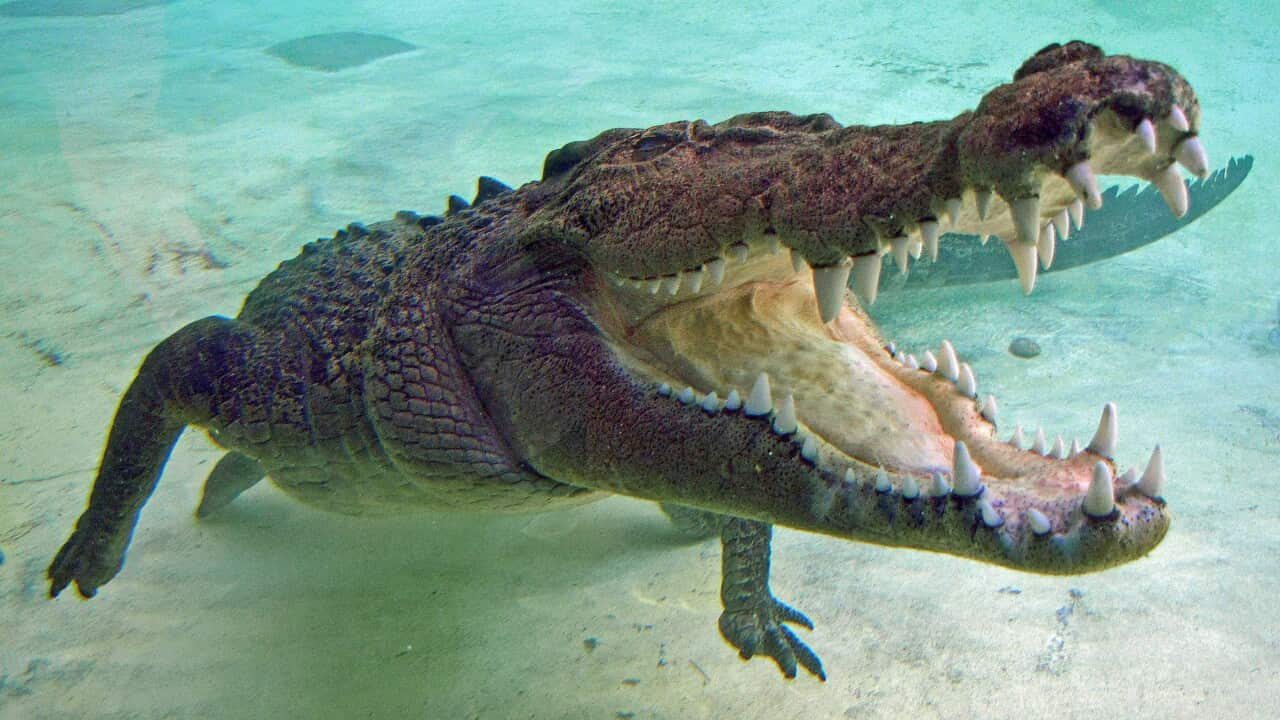With the Northern Territory announcing that it will reinstate the right to apply for a permit to keep a pet crocodile, some may be wondering what it's like to have such a reptilian resident on one's premises.
Former crocodile owner Vicki Lowing said pet crocodiles can be rewarding and surprising house companions if owners are willing to provide them with a suitable home.
When she first adopted a croc, not a lot was known about keeping them as pets, she told SBS.
"A lot of it was just common sense and experience," said Lowing, who's based in the outer western suburbs of Melbourne.
Victoria and the NT are the only two Australian jurisdictions in which it is legal to own a pet crocodile, although the Victorian government recommends that "only crocodiles up to a total length of 2.5m are kept".
"I found, because at the time I didn't have proper setups or anything, the crocodile was like a cat that walks around the house, so it was domesticated, and through that, we formed a bond. They bond with their owners," Lowing said.
But she warns that a pet croc certainly isn't as easy to care for as a cat or dog.
"You've got to look at their diet; you got to have the sun, the vitamin D, the temperature has to be 30 degrees all year around," she said.
"They like a lot of water, so I had big ponds built. Also, a lot of people seem to, I've noticed, neglect the amount of ground they need to walk around on because they're nocturnal, and they like to do a lot of walking.
"Because mine at the time was free to walk around the house and the garden, I noticed that they move around a lot, especially nocturnally, so they need plenty of space.
"The longer you have them for, the more you see how intelligent they are, which really blows you out."
LISTEN TO

Snap decision; Crocodiles back on the NT's pet list
SBS News
24/12/202405:14
"They learn fairly quickly, and they've got a good memory … They can bond, and they can be affectionate, to a certain degree," Lowing said.
"They're not these nippy, bitey horrible creatures that people see them as. In the wild, that's different, but they have the capability of being domesticated."
However, Lowing warns that even a domesticated crocodile can pose a danger.
"[You] always have to be wary of them, of course," she said.
"They move stealthily."
As a result, crocodile enclosures must be thief-proof, she said, unless owners want to explain to the police why the person who tried to rob them is now in the belly of their pet.
The ban and backlash
Lowing no longer has any crocs at home, having sent the last of her pets up to the NT several years ago.
Despite the complexity and risks, owning a pet crocodile is still popular in the Top End.
When the then-Labor government stopped issuing new permits for pet crocodile ownership in April, it sparked debate and later became an agenda item for the August election.
Some animal advocate groups supported the ban.
Olivia Charlton, from World Animal Protection, told the BBC in August that crocodiles could not have their needs met in captivity.
"There is no way to replicate the space and freedom these crocodiles would have in the wild, particularly given they live for up to 70 years," she said.
Charles Giliam from the NT branch of the Royal Society for the Prevention of Cruelty to Animals said it was difficult for authorities to ensure pet crocodiles are kept in proper conditions and receive appropriate medical care.
After winning the election, the Country Liberal Party has announced it will begin re-issuing new permits.
NT Minister for Parks and Wildlife Marie-Clare Boothby said her government was committed to ensuring safety and animal welfare standards.
"Crocodiles are synonymous with the Territory — that's what makes our lifestyle so unique — and responsible owners have a right to own one with a permit," she said.
The ban on new crocodile permits was issued as part of the NT Labor's crocodile management plan, in the wake of the growing number of saltwater crocodiles in the region.
The species were protected from mass culls and hunting in NT in 1971, and since then, their numbers have grown from around 3,000 to 100,000.
Last year, a tourist was bitten by a saltwater crocodile in one of the popular destinations in Darwin.
Labor's 10-year crocodile management plan also included increasing the culling quota of saltwater crocodiles.
Alexander Williams, the head skipper of the Jumping Crocodile Cruise said the authorities have set good rules to assess those seeking to own a pet crocodile.
However, he believes more could be done, especially now that the government has resumed issuing the permits.
"It should be a little bit more stringent with allowing people to get them, and there are already good contingencies in place for that.
"If you live in urban areas you can only keep them to a certain size, I think that's a great rule, it's an incredibly good idea, but I think there could be a few more measures in place to keep both the animals and owners safe."











